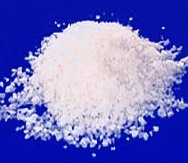Magnesium chloride
- Home
- Magnesium chloride
100% natural certification
Magnesium chloride is an inorganic mineral compound consisting of one magnesium and two chloride ions. The compound is used in medicine as a source of magnesium ions, which are essential for many cellular activities.
It is a 'medical miracle from the sea' and is popularly referred to as magnesium oil that is easily assimilated and metabolized in the human body.
 Magnesium chloride
Magnesium chlorideMagnesium chloride in sunscreen
We have chosen to include magnesium chloride in our Sunumbra Sports sunscreen for the following reasons:
- Magnesium is extremely important to athletes as it participates in the process of energy metabolism, being essential to producing adenosine triphosphate (ATP), which is the main source of energy in human cells
- it regulates heart rhythm
- it assists in the maintenance of normal muscle contraction and relaxation - as a natural calcium blocker, it helps your muscle cells relax after contracting, promoting quick recovery
- It also activates enzymes that enable the body to convert vitamin D to its active form, which in turn enables absorption of calcium required for building healthy bones.
- it maintains optimum blood pressure
It also helps to keep your skin healhty:
- Magnesium helps support the synthesis of collagen and a lack of collagen as we age is one of the key factors in wrinkles
- Without adequate Magnesium, your skin is far more susceptible to harmful free radical damage that can ultimately lead to wrinkling and skin damage
Magnesium chloride - Master Magnesium Compound?
Magnesium Chloride is recognised by many medical professionals as the "Master Magnesium Compound" for both dietary and topical uses, due to its high potency and efficient action.
However, a magnesium deficiency is often not realised as it is not tested easily in blood tests:
- Only 1% of the body's magnesium is in the blood.
- 50% of your body's magnesium is in your bones.
- The rest is found inside your body tissues cells and organs
Magnesium deficiency has wide ranging effects that are suspected to cause more diseases than realised. It regulates calcium, potassium and sodium, so is important to all three. Its likely that millions suffer every day from a magnesium deficiency without realising it.
Magnesium is undeniably therapeutic to the human body, yet much is left unsaid about the type and quality of the various forms of magnesium.
Magnesium chloride boosts almost all aspects of cell physiology and does this best transdermally.
It provides for all of the following:
- Improves the function of cells and the immune system and helps protect cells from oxidative damage.
- Decreases muscle pain, cramps and fatigue as all are signs of magnesium deficiency.
- Enhances recovery from athletic activity or injuries.
- Reduces pain and inflammation while propagating quicker regeneration of tissues.
- Topical application increases flexibility, which helps avoid injury.
- Increases strength and endurance.
Transdermal application of magnesium chloride
Topically applied, magnesium chloride is the most effective means of magnesium supplementation.
The essential importance of topical or transdermal application of magnesium chloride is that the intestines are bypassed and therefore large doses of oral magnesium are not required. You can apply it directly to the skin for almost instant relief for pain, inflammation and a wide range of other physiological functions, including increasing ATP production and oxygen-carrying capacity.
Magnesium is essential for life and is a true cellular tonic that helps us heal from the inside out, addressing as it does a broad range of fundamental physiological processes.
One would not normally think that Magnesium (Mg) deficiency can paradoxically increase the risk of cancer, yet we will find that just as severe dehydration or asphyxiation can cause death, so can magnesium deficiency directly lead to cancer.
Magnesium is a mineral that plays a critical role in over 300 enzymatic processes in your body and is required by virtually every cell.
Also, its role in fatty acid and phospholipids acid metabolism affects the permeability and stability of membranes.
So, we can see that magnesium deficiency would lead to physiological decline in cells, thereby setting the stage for cancer.
Have a question yourself?
Do you have a question or perhaps wish to make a comment or even tell a story about an experience with sunscreen? Please share it! Others will benefit and may join the conversation.







